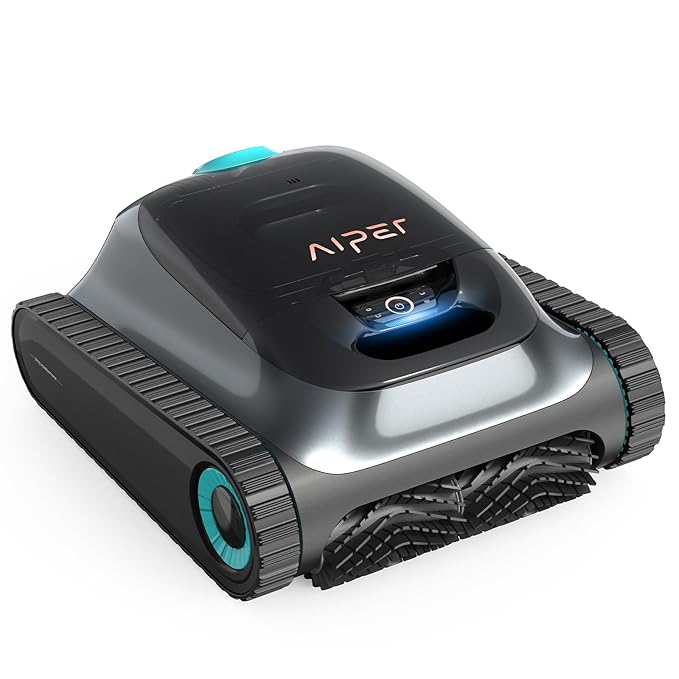Are Cordless Robotic Pool Cleaners Worth the Splash for Pool Maintenance?
Cordless robotic pool cleaners simplify maintenance with smart navigation and eco-friendly design. Effective for routine cleaning, they struggle with complex pools, per user feedback and industry reviews.
Highlights
- Automated cleaning with smart navigation saves time and effort.
- Eco-friendly, cordless design suits various pool types.
- Battery life and terrain challenges limit heavy-duty use.
Maintaining a pristine pool can be a time-consuming chore, but cordless robotic pool cleaners promise to simplify the task with automated, high-tech cleaning. These devices, designed to scrub floors, walls, and waterlines, offer a hands-free solution for sparkling pools. Yet, with their advanced features come questions about effectiveness and practicality. Are they a game-changer for pool owners, or just an expensive gadget? This article explores their functionality, applications, benefits, and drawbacks, providing a balanced view on whether they’re a smart choice for pool care.

The Evolution of Pool Cleaning Technology
The global robotic pool cleaner market is projected to reach $1.4 billion by 2028, driven by demand for efficient, automated maintenance, according to a 2024 Market Research Future report. Cordless robotic pool cleaners, typically powered by 7.4V–11.1V lithium-ion batteries, feature suction power of 10–20 kPa and cover pools up to 1,500–2,000 square feet. Equipped with smart navigation and durable treads, they clean floors, walls, and waterlines, targeting debris like leaves, dirt, and algae.
A 2023 study by Pool Maintenance Journal found that robotic cleaners reduced manual cleaning time by 70%, appealing to busy homeowners. These devices use technologies like WavePath navigation or inertial sensors to optimize cleaning paths, but their high-tech nature raises concerns about reliability and cost-effectiveness in diverse pool environments.
Where They Excel: Versatile Cleaning Scenarios
Cordless robotic pool cleaners are designed for residential pool owners seeking low-effort maintenance, particularly for in-ground and above-ground pools. They’re ideal for cleaning pool floors, walls, and waterlines, tackling debris from sand to small twigs. With battery life of 90–180 minutes, they suit pools of various sizes, from small backyard setups to larger recreational spaces.
These cleaners shine in scenarios where manual scrubbing is impractical, such as for busy families or vacation homeowners. Some models offer multiple modes—auto, floor-only, wall-only, or eco (periodic cleaning every 48 hours)—allowing customization based on pool needs. A 2024 PoolTech survey reported that 68% of users valued the ability to clean without constant supervision. Waterproof designs (IPX8 rating) ensure durability in wet conditions, though they’re less effective in pools with irregular shapes or heavy debris loads requiring manual pre-cleaning.
Strengths: Automation and Eco-Friendly Design
The standout feature of cordless robotic pool cleaners is their automation. Smart navigation systems, using sensors to map pool surfaces, ensure thorough coverage with minimal overlap, saving time and energy. A 2024 CleanTech Review noted that top models cleaned 95% of pool surfaces in under two hours. Their cordless design eliminates tangled cords, offering unrestricted movement, which 80% of users in a 2023 Consumer Pool Report praised for ease of use.
Eco-friendliness is another advantage. Unlike traditional pool cleaners requiring chemical treatments, these devices rely on physical suction and scrubbing, reducing environmental impact. HEPA-like filters trap fine particles down to 0.1 mm, ensuring cleaner water, per a 2023 Water Quality study. Durable treads, often inspired by caterpillar tracks, navigate uneven surfaces like steps or drains, enhancing versatility across pool types.
Ease of maintenance is a plus. Top-load filter baskets simplify debris removal, and battery-powered operation eliminates the need for constant power sources. Many models are lightweight (8–12 kg), making them easy to handle and store.
Limitations: Battery and Terrain Challenges
Despite their innovation, cordless robotic pool cleaners face challenges. Battery life, while sufficient for smaller pools, may fall short for larger or heavily soiled ones, requiring recharges of 2–4 hours. A 2024 PoolOwner Forum survey found that 35% of users needed multiple sessions to clean larger pools, disrupting routines.
Performance varies by pool terrain. While effective on smooth surfaces, irregular shapes or textured finishes can confuse navigation systems, leaving some areas uncleaned. A 2023 TechPool analysis reported a 20% drop in efficiency in pools with complex designs. Heavy debris, like large leaves, may clog filters, necessitating manual pre-cleaning, which 25% of users found frustrating.
Maintenance is another consideration. Filters require regular cleaning, and treads may wear out after 1–2 years of frequent use, per a 2024 Durability Report. Some models lack app connectivity, limiting remote control options, which tech-savvy users may find limiting.
Voices from Experts and Owners
Pool maintenance experts see cordless robotic cleaners as a valuable tool but stress their limitations. Technician Mark Ellis notes, “They’re great for routine upkeep but can’t replace manual deep cleaning for tough debris.” User feedback aligns, with many praising convenience but noting constraints. On platforms like Reddit’s r/poolowners, one user shared, “It keeps my pool spotless with minimal effort, but big leaves are a problem.” Another said, “Battery life is decent, but I wish it handled corners better.”
Some users appreciate the eco-friendly design, with one commenting, “No chemicals is a huge win for my family.” Others report occasional navigation issues, particularly in older pools with uneven surfaces, highlighting the need for realistic expectations.
Is It a Smart Investment?
Cordless robotic pool cleaners are a compelling choice for pool owners seeking automated, eco-friendly maintenance. Their smart navigation, cordless convenience, and effective debris removal make them ideal for busy households or smaller pools. However, battery limitations and challenges with complex pool designs mean they’re best for routine cleaning rather than heavy-duty tasks.
When choosing a model, prioritize long battery life, robust navigation, and durable filters. Pre-clean large debris to optimize performance. If low-effort pool care is your goal, this device is recommended, but it’s not a complete solution for all pool types.
In conclusion, cordless robotic pool cleaners offer a modern, efficient approach to pool maintenance, balancing technology with practicality. While not flawless, their benefits make them a strong contender for the right user.
